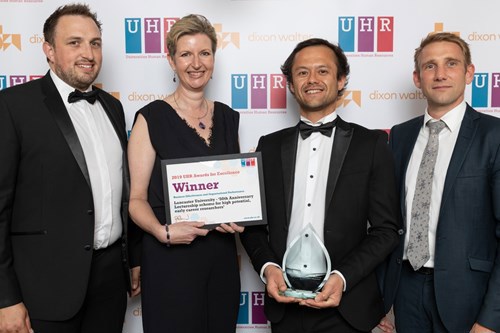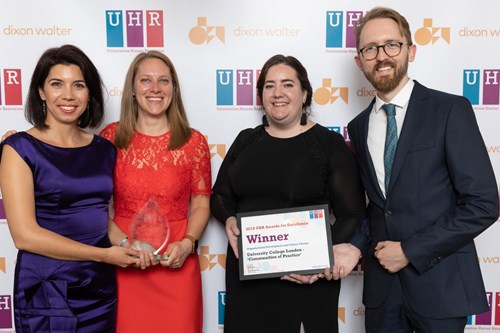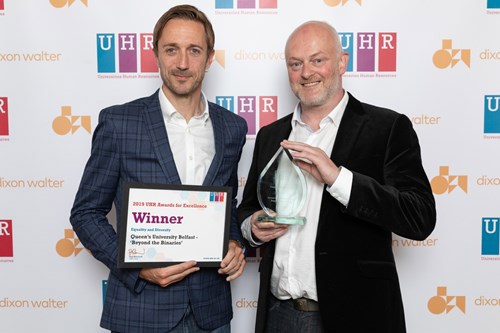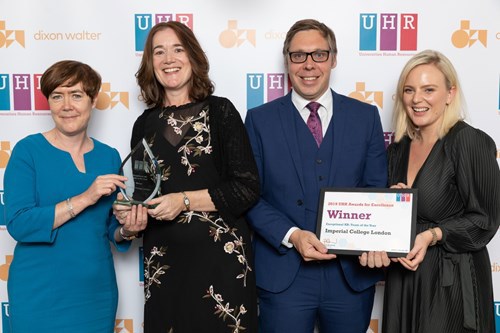The winners of the UHR Awards for Excellence in HR were announced at our annual conference in Manchester on May 23rd 2019.
For an initiative that has driven and demonstrably enhanced organisational performance and competitive advantage

Lancaster University had already enjoyed many accolades, and the calibre of teaching/research over the last 50 years enabled a steady climb up the league tables. The 2014 Research Excellence Framework (REF) confirmed Lancaster as a world-leading research university, and as one of eight most research-intensive universities in the North of England with 83% of research rated as either internationally excellent or world leading, with research partnerships in over 60 countries.
The University’s ambition was to both future proof and build on its success through the next generation of academics. To achieve this a talent management pipeline (The 50th Anniversary Lectureship scheme) was created that cemented the aims of the University’s 2020 vision, to attract, develop and retain the best staff.
As Annette Robinson, Organisational Develop at Lancaster explained: “The 50th Anniversary Lectureship scheme emerged as an initiative to attract, develop and retain a cohort of high potential, early career researchers. Over the 5-year period of the scheme, the role-holders would develop their research portfolios and achieve fast-track academic promotion, assisting the University in not only raising profitability/research status, but also that the next generation of world leading Academics would emerge. The project has made an enormous impact at Lancaster.”
Speaking on behalf of UHR, Helen Scott said: “This submission describes HR work at its best, ensuring the quality and performance of academic staff is at the heart of HR’s role in a university. The approach encouraged multidisciplinary activity and academic colleagues were encouraged to see themselves as part of the collective (which doesn’t always happen). Lancaster took and trialled some new approaches which may not have been possible with ‘regular' new appointments. The submission sets out an impressive range of statistics about the return on investment and the value being added – the judges felt the outcomes and benefits are measurable and very impressive.”
NB. Given the conflict of interest between UHR Chair Paul Boustead, as both judge of the awards and Director of HR at Lancaster University, UHR Executive Director Helen Scott represented UHR in judging this category.
Runners-Up in this category
Staffordshire University: Employee Engagement App
Staffordshire University’s Employee Engagement App is an excellent example of empowerment, recognition, building a sense of community and alignment with University goals, all of which are the key ingredients of building and developing employee engagement.
The App was the first social media platform for staff which has had a significant impact on the way that we communicate and build engagement and marked a shift of approach to true colleague engagement.
The App has improved understanding of the relevance of the University’s Corporate Key Performance Indicators (KPIs) to individual work roles and is now so well embedded within the University that it is seen as the “go-to” communication tool for staff which has been instrumental shaping the way that we communicate at the University.
Speaking on behalf of UHR, Awards judge Helen Scott said: “The idea, the functionality, the speed of impact, the ease of use and 'feel good' created by the App were all appealing. It is different and is responding to the changing ways in which we are receiving and consuming updates and general communications.
For an initiative that achieved transformational culture change or greater staff engagement, or involved collaborative work with another organisation, enabling the university effectively to meet future challenges and uncertainty.

Communities of Practice (CoP) at UCL unite staff working in similar areas and functions in order to help members develop professionally, improve their practice and services and maximise career opportunities. They provide staff with opportunities to learn from each other by sharing knowledge and expertise, by working together on self-selected projects, and by co-creating an end-to-end view of their service and a vision of excellence. Each CoP is supported by a Senior Sponsor who provides top-level recognition, championing and strategic alignment.
CoPs at UCL have proved to be an empowering grass-root model of change and service improvement that engages staff in leading the change themselves and connects colleagues across the organisation. CoPs enable cross-collaboration and developments across the institution, as they bring together professional service staff from both central functions and local academic areas. They encourage cultural change to the way staff work in a dispersed organisation, so moving away from silos to sharing knowledge and resources, to solving shared problems and using collective knowledge to co-create and continuously improve their practice.
UCL currently has over 1,000 CoP members and over 40 CoP-led projects across the institution. There are 12 CoPs across six professional service areas and the goal is to set up CoPs across all major service areas at UCL. Some of the latest CoPs, have brought together both professional service staff and academic staff. We envisage that CoPs will build more synergies between these groups, encourage-cross collaboration and create more value by working closer together.
Daniela Bultoc, Head of Communities of Practice at UCL, said: “Introducing Communities of Practice has made a real impact at UCL. The Communities have proved to be an empowering, grass-roots model which have led to positive cultural change, encouraging collaboration across professional services and academic areas by bringing together colleagues who work in similar practice areas. The UCL Communities of Practice provide staff with opportunities to learn from each other, share knowledge and expertise, have a collective view of excellence and improve their practice. We would like to recognise all the staff who are part of a Community of Practice for their great work and commitment to this exciting, new way of working for UCL.”
Speaking on behalf of UHR, Helen Scott said: “UCL were able to give the judges so much tangible information about the outputs of the project. They’ve moved away from silos, empowered people to solve problems and make change using collective knowledge to create better practice. The initiative has had a huge impact on the organisation and its approach to development and culture change, involving so many individuals and solving knotty problems.”
Runners-Up in this category
University of Northampton: Campus Relocation
This was a large-scale, multi-dimensional transformational change project involving the relocation of the entire University to a new purpose built £330 million campus in the town centre. This was in addition to a change to our teaching approach and ways of working for staff; and delivering a new student and staff experience. These changes, incorporating such a broad scope of issues and happening simultaneously, were challenging.
The relocation meant a significant change in organisational structure was required to ensure delivery could be achieved effectively and with minimal disruptive impact on the student experience.
The new work locations meant there would no longer be individual offices for any staff including those at senior levels, and for the majority, they would not have a specific desk for themselves either. Instead, an open-plan, agile working environment was introduced where staff would have the opportunity to work in multiple areas depending on the task in hand. It was recognised that this would mean a significant change in culture, in addition to the fact that all staff would have to be trained and to get used to the new ways of working and the use of new devices and communications tools.
Before the restructuring, each School and Department (as they were previously entitled) had dedicated administrative support teams dealing with their finance and operational requirements. However, to ensure a consistent, streamlined service could be achieved by all the support teams, where maximum efficiencies could be attained, a centralised approach was introduced instead. Again, this meant a significant change in working practice both for those in the support teams and the ‘customers’ within the schools and departments.
The entire relocation and restructuring process was underpinned by multiple HR projects which were ultimately integral to its success.
On behalf of the judges Helen Scott “felt this was a very strong entry with clear evidence of the ways culture had been changed as part of a campus relocation, and transferable learning from the project for other HEIs considering similar initiatives in future.”
For an initiative that improved equality or diversity in the organisation and brought demonstrable improvements to performance or engagement.

This was an innovative and unique project involving collaboration between trans, non-binary and cisgender staff, students and community organisations at Queen’s University, Belfast.
Having introduced a new Transgender Equality Policy and training offering for all its staff, the University, Students Union and external community groups from the Belfast Resource Centre developed a week-long programme of events entitled “Beyond the Binaries”. Focussed on showcasing the talents of trans students and staff at QUB, the programme featured an art exhibition; choral performances; a comedy night; musical performances; and practical workshops on transgender rights in the workplace and “budgeting on a shoe-string” – empowering trans students and staff to be more visible, confident that they were being supported by the University.
This work has led to greater awareness and acceptance of trans and non-binary staff and students at the university, having been supported by the Senior Management and civic leaders such as Belfast’s Lord Mayor. The impact of the work is still being felt in a positive way with 4 Transgender Awareness staff training sessions delivered each year (2017-2019), all of which are delivered by Dr Ellen Murray, a former student at the University, transgender woman, and highly respected policy advocate who is based in Belfast.
“We are delighted to win this award,” said Conor Curran, Head of Diversity and Inclusion at QUB. “It recognises the work undertaken at Queen’s University Belfast to raise awareness about Transgender rights and ensure that all those working and studying here feel welcomed, valued and supported – regardless of their gender identity. That work started 3 years ago when our HR Directorate consulted on and implemented a new Transgender Equality Policy, which applies to all staff and students. By working together with external Transgender Rights advocates, the University has, over the last 3 years, delivered regular lunchtime training workshops for both staff and students on Transgender rights; it has introduced 14 All Gender Facilities on campus; a new LGBT+ Staff Network (called “PRISM”) while the Students Union has hosted and delivered the “Beyond the Binaries” Programme of arts, music and comedy events for our LGBT+ students on Transgender awareness. The impact of our initiative has been significant, with Queen’s University recognised as a leader in this field. We have recently supported 15 students who requested to officially change their gender – the second highest rate among UK universities. We’re extremely proud to be leading the way in this area, working collaboratively with the 3rd sector and Trans organisations such as SAIL NI and Gender Jam, in the Greater Belfast area, to break down barriers and dispel common myths through engagement, education and awareness raising in order to provide a better staff and student experience for all.”
Helen Scott of UHR spoke on behalf of the judges: “This was an impressive entry, with impact in an area where it’s difficult to get traction, in a challenging environment. We felt the impact was very focused, and Queen’s have shown demonstrable impact leading to change.”
Runners-Up in this category
University of Surrey: Employment Works programme
This flagship programme provides internships to people with special educational needs, giving them the opportunity to see themselves as valued employees, contributing as equals to team goals. The Employment Works project has shown over eight years that no disability should be a barrier to young people gaining confidence, self-esteem and foundational work skills. People like Daniel, Lewis and 60 others have had the chance to reach their potential. This is change that sticks and has a real impact: more than 30 Employment Works alumni have taken up paid work or apprenticeships – an unthinkable achievement before taking part in the programme.
Working alongside other colleagues, participants not only gain work experience, they develop interpersonal skills, working in a team and sharing responsibility as part of the group.
A key success of this programme is that staff at the University do not see participants as disabled.
“I love the attitude of the University staff. They don’t employ disabled people, they employ a ‘Daniel’ or a ‘Lewis’ who just happen to have a disability” (David O’Connor, Employment Works job coach).
This brings benefit to the University and helps the interns recognise their value as individuals with an identity that is defined by more than a disability.
“Surrey’s work has real impact, with evidence of longevity of the project through many cycles, and that ripples out and is sustained way beyond the university itself,” said Helen Scott of UHR on behalf of the judges.
The category showcases exceptional HR achievement by an HR team, in its context.

In the past, Imperial College had a reputation of being a tough place to work. The College’s 2015-2020 strategy set out to challenge this perception and to ensure that staff felt supported and valued even in a highly competitive external environment. The HR team recognised that change would not be felt unless all the community came together to improve the culture and behaviours and to support each other. They also recognised that the changes needed to be driven from all areas of HR. A range of initiatives were therefore developed in conjunction with the staff community. This approach was highly successful, and the College now has volunteers from all departments and all grades supporting colleagues in accessing services, coaching, mentoring, mental health awareness, career progression and social activities.
The HR team at Imperial have also improved consultation and engagement with the wider College community. This has included education and feedback during local pay bargaining that has changed the pay and benefits offer and supports lower paid staff. The HR team have demonstrated successful collaboration and engagement with change programmes for their own restructure and also by developing and supporting wider continuous improvement champions for change across the organisation.
Imperial College is still a demanding place to work but there is now evidence of a successful HR partnership on the people agenda working with the wider community on a shared agenda of collaboration and mutual support to improve the working lives and experiences for staff at Imperial College.
“I am delighted that the HR team at Imperial have won this award,” said Louise Lindsay, Director of HR and Organisational Change. “It is recognition of the breadth and impact of the wide range of initiatives developed by HR in support of our people. Our success would not have been possible without the valued contribution made by the many volunteers across the organisation who generously give their time to support others in our community. They share in the success of this award.”
Speaking on behalf of UHR, Helen Scott said: “This was a very high-quality awards entry that would hold its own in awards beyond the HE sector. The vision was so clear, well explained and positive, with lots of learning to share, including that HR had heard and understood that Imperial was regarded as a hard place to work, and how HR was perceived within that. Achievements were real, tangible and there was a strong narrative to explain this. Some of the achievements were softer and cultural, which can sometimes get lost in the pursuit of KPIs but are real nonetheless. There is real strength in how Imperial engaged staff, innovated, and measured what had been done, demonstrating impact with data.”
Runners-Up in this category
University of Westminster
The University had a financial challenge which required a restructure from five faculties to three colleges with a total staff cost savings of £21 million between April 2017 and 31 July 2018 (15 months). During this restructure the HR and OD department was itself being reduced by 70 percent.
Staff and non-pay cost pressure at the University had continued to exert an upward shift in costs – rising at a time when overall University income is falling. HR was responsible for ensuring that there was a clear strategy and operational plan (5 phases) in place that delivered the cost savings and new structure within the timeframe set by the Court of Governors.
Some of the key activities that enabled the HR function to operate and deliver to tight timescales in difficult and challenging times included: A robust communication plan; HR providing manager briefings and a suite of guidelines & templates to empower managers to lead on formal consultation meetings (without HR present) ensuring ownership at a local level; and offering a wide range of resources and services to assist and engage staff during this period of organisational change (e.g. Career Support Portal, career coaching and resilience workshops).
This project demonstrates that despite the enormity and scale of the task and the very tight timeframe, a well-planned and high performing HR team can make a real and sustained difference to the challenges and operational difficulties that the sector currently finds itself operating within.
Speaking on behalf of the judges UHR’s Helen Scott said: “The team delivered in a short time, a significant restructuring and savings that had a material and demonstrable impact on the university’s reputation, culture and financial position, while maintaining quality of service. Achieving this against a backdrop of significant cuts in the HR team itself was notable.”
Judges
The judges for the 2019 Awards were: Paul Boustead, UHR Chair; Dean Royles, HPMA President; Daphne Doody-Green, Head of CIPD North; Professor Andrew Wathey, Vice Chancellor of Northumbria University; and Kiersten Avery, of awards sponsor Dixon Walter.